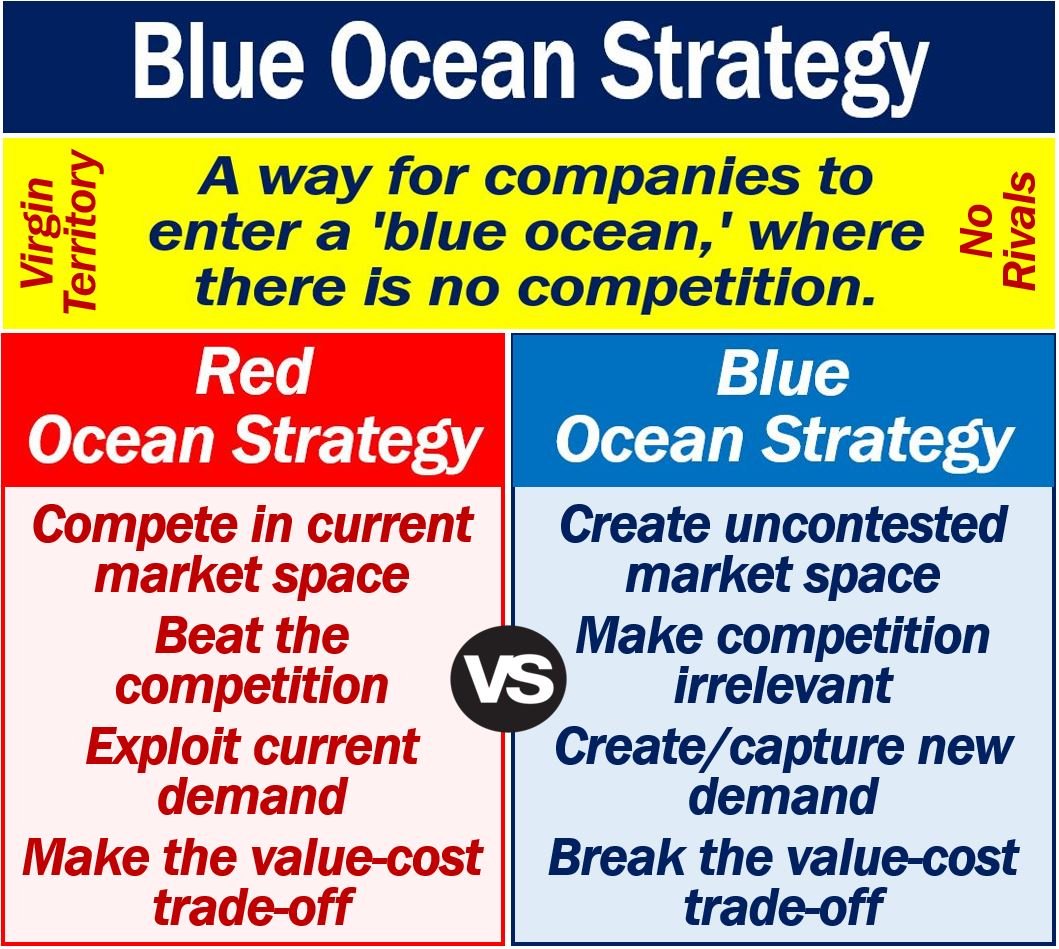Blue Ocean Strategy is a marketing theory in which a business enters a market that has little or no competition. The strategy focuses on moving away from an existing market and seaching for new markets.
Specifically, these new markets give a company a very high competitive advantage as well as low price/cost pressure.
Put simply; the strategy involves getting out of a fiercely competitive, saturated market and into ‘virgin territory.’
Professors W. Chan Kim and Renee Mauborgne introduced the strategy in their book ‘Blue Ocean Strategy: How to Create Uncontested Market Space and the Make Competition Irrelevant.”
In their 2005 publication, the authors stated that companies were better off exploring new markets. They believed that competing in a saturated market was a bad choice.
Regarding Blue Ocean Strategy and the authors of the book, BlueOceanStrategy.com writes:
“The authors argue that lasting success comes not from battling competitors but from creating ‘blue oceans’ – untapped new market spaces ripe for growth.”

INSEAD Blue Ocean Strategy Institute
The authors were co-directors of the INSEAD Blue Ocean Strategy Institute. They were also INSEAD professors. INSEAD is a prestigious graduate business school in Fontainebleau, France.
INSEAD also has campuses in Singapore and Abu Dhabi. The letters INSEAD stand for Institut Européen d’Administration des Affaires, which translates into English as the European Institute of Business Administration.
Who’s Blue Ocean Strategy for?
The authors wrote that Blue Ocean Strategy is a theory that targets companies that are fighting for market share. Specifically, companies that are fighting in a fiercely competitive market which contains major players, i.e., strong competitors.
Professor Chan Kim said:
“The Blue Ocean Strategy is particularly needed when supply exceeds demand in a market.”
In a fiercely competitive saturated market, companies struggle to stay alive over the long-term.
We call this type of marketplace a ‘red ocean.’ In this context, ‘marketplace’ means the same as ‘market’ in its abstract sense.
A ‘red ocean,’ therefore, is the opposite of a ‘blue ocean.’
A read ocean has reached saturation point, i.e., there are too many competitors fighting for market share. A blue ocean, on the other hand, is ‘virgin territory.’
Creating a Blue Ocean Strategy
There are two ways we can create a Blue Ocean Strategy.
A brand new product or service
One is by launching or introducing a completely new product, service, or concept.
This happened, for example, when Apple created its iTunes music download service in 2003.
At the time, it was common for people to download music illegally online or physically buy the CDs.
Apple introduced a new legal platform for users to get their music. The company offered higher quality music along with an extensive library and other functions at a reasonable price.
Develop uncontested market space
The second way is for a company to transition or try to expand out of an existing industry. In other words, it tries to expand from a red ocean to a blue one.
For example, Cirque du Soleil focused on reinventing itself rather than competing in a declining market.
The circus realized that people did not want to go to the circus any more. Everybody had become more aware of animal abuse, especially within the circus industry.
The company presented a higher value show with no animals. It targeted not only children but adults too.
Cirque du Soleil expanded their market to higher-spending consumers and secured a strong competitive advantage.
When a company has a ‘competitive advantage,’ it has an edge over its rivals. It has something that consumers like, but its rivals do not have.
Regarding Cirque du Soleil, Professors Chan Kim and Mauborgne wrote:
“Despite a long-term decline in the circus industry, Cirque du Soleil profitably increased revenue 22-fold over the last ten years by reinventing the circus.”
“Rather than competing within the confines of the existing industry or trying to steal customers from rivals, Cirque developed uncontested market space that made the competition irrelevant.”
Video – Blue Ocean Strategy
In this WOBI video, Prof. Renée Mauborgne tells us how to create uncontested market space, thus making the competition irrelevant.
